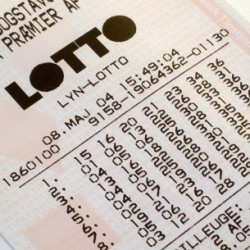NASPL Voices Opposition To Restoration Of America’s Wire Act

Since U.S. Senator Lindsey Graham (R-South Carolina) and Representative Jason Chaffetz (R-Utah) introduced their identical anti-online gambling bill, the Restoration of America’s Wire Act (RAWA), to both The Senate and The House at the end of March, opposition to the proposed legislation has continued to mount.
The latest pro gambling groups attempting to influence lawmakers in Congress are The North American Association of State and Provincial Lotteries (NASPL), and the National Conference of State Legislatures (NCSL), who both raised their objections to the bill which seeks to ban all forms of online gambling in the USA, including online lotteries.
NASPL responds to Senator Graham’s proposed new law
This week, The North American Association of State and Provincial Lotteries entered the fray by sending a letter to Senator Graham emphasizing their position that individual states should be allowed to make up their own minds whether to offer lottery products online, and not be dictated to by the US government. In the open letter sent to Senator Graham by NASPL Executive Director David Gale, the organization warned against “unwarranted preemptions of state laws and federal legislation that threatens state authority and autonomy” whilst also emphasizing the multitude of lottery funded good causes which could suffer as a result of the Restoration of America’s Wire Act. As an extract from the NASPL letter, reads:
“This is, and has always been, a state’s right to make these decisions as they relate to gaming within its respective boarders. Since lottery products are sold in a competing market, it is important that we continue to design and offer secure games that people want to play so that lottery states can continue to fund the much-needed programs and/or services for which lottery revenues are earmarked.”
Both sides claim to be protecting the right of states
Interestingly, in 2011 it was a new opinion sought by the New York and Illinois lotteries from the U.S. Department of Justice which eventually lead to the Wire Act’s reinterpretation to only apply to sports wagering, and not to lottery ticket sales over the Internet.
This subsequently also cleared a path for legalized Internet poker to be offered to American gamblers.
Both sides of the debate have since lined up on opposite sides claiming to represent the rights of consumers and individual states alike, with billionaire casino magnate Sheldon Adelson and his lobby group the Coalition to Stop Internet Gambling leading the push to reverse Attorney General Eric Holder’s 2011 Wire Act reinterpretation.
Illinois Lottery contradicts online gaming arguments
The North American Association of State and Provincial Lotteries (NASPL) represents the interest of 52 lotteries spread out across the USA, Canada, Puerto Rico and the Virgin Islands. The various lotteries subsequently generated combined sales of more than $83.3 billion last year, with a massive $23 billion then funneled into government coffers.
Currently in its second year of selling lottery tickets online, the Illinois State Lottery also took the opportunity to counteract some of Sheldon Adelson’s arguments this week, after Illinois Lottery director Michael Jones revealed the organization had managed to achieve $36.9 million in ticket sales since launching, without suffering any of the issues highlighted by anti-gambling groups, such as geo-location, money laundering or age-verification problems.
Geolocator Technology working just fine
After presenting his Restoration of America’s Wire Act, US Senator Lindsey Graham (R-South Carolina) also took the opportunity to claim the law passed by his state almost twenty years ago making it illegal to gamble on slot and video poker machines was rendered useless after Delaware and New Jersey introduced online gambling. Graham’s argument is that South Carolina residents are now able to access other states’ websites using their cellphones, but the actual evidence would suggest otherwise. Geolocation company GeoComply, for instance, which is used by 10 out of New Jersey’s 11 online gambling sites, recently claimed a 95% success rate thus ensuring almost no gamblers from out of state jurisdictions can access neither services.
Therefore, South Carolina is in little danger of its residents flocking to New Jersey’s online gambling sites, whereas New Jersey’s nascent igaming industry is currently threatened by the anti-gambling legislation South Carolina’s legislature is attempting to impose on New Jersey, and the country as a whole. This is another major reason explaining why NASPL Executive Director David Gale wrote his letter to Senator Graham, highlighting the right of individual state’s to manage their own affairs.
Although the NASPL is not involved in other types of online gambling activities, such as casino games and online poker, the organization does have a stake in the approach the central government takes towards gaming laws in general, recognizing a federal government with limited powers is less likely to pass iGaming laws which could then be used to attack interstate lotteries.










